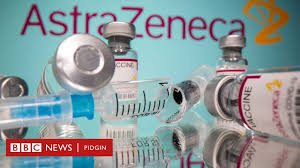 Head of Haematology and Blood Transfusion at the Lagos University Teaching Hospital, Idi-Araba, Prof. Sulaimon Akanmu says the Oxford-AstraZeneca COVID-19 adverse effect is meant to be hemorrhage, and not blood clot.
Head of Haematology and Blood Transfusion at the Lagos University Teaching Hospital, Idi-Araba, Prof. Sulaimon Akanmu says the Oxford-AstraZeneca COVID-19 adverse effect is meant to be hemorrhage, and not blood clot.
He noted that scientifically, based on the composition of the vaccine, what should be expected is bleeding complication. He, however, said blood clot, which is being experienced, is a very dangerous medical condition that can lead to death in the absence of immediate medical intervention.
The haematologist averred that the most dangerous form of blood clot is known as massive pulmonary embolism that occurs in the lungs, adding that if not detected on time, the difference between life and death might just be an hour.
Prof. Akanmu described pulmonary embolism as a silent killer, stressing that it is the major cause of death associated with clot formation.
The haematologist said he hoped that epidemiological review will prove unfounded the claim about AstraZeneca vaccine causing clot.
Speaking with our correspondent on the global response to the Oxford AstraZeneca vaccine, the don said, “The little that we know about the science behind the production of the vaccine is that it is very unlikely that it could be associated with blood clot.
“In fact, by my own study of the component of AstraZeneca vaccine, I would have thought that the complications expected from it would be opposite of blood clot, meaning some form of bleeding or haemorrhage.
“This is because what was done in AstraZeneca vaccine was to collect the DNA sequence of the spike protein of coronavirus and then join it with the gene of the protein called Tissue Plasminogen Activator.
“What they used as a ladder gene for the Sars-Cov-2 virus spike protein gene was the gene that is responsible for the production of the tissue plasminogen activator.
“So, what we expect from an individual that has been so vaccinated with the Sars-Cov-2 vaccine of the AstraZeneca type, is that as you begin to produce the spike protein of the virus, you will also begin to produce the tissue plasminogen activator that was complex with it.
“The normal function of the tissue plasminogen activator is that it will disperse to activate a protein in the blood called plasminogen which, when it is activated, is converted to plasmid.
“What it does is that where there are clots in the human body, it dissolves them. If the clot is not found in the human body and you have tissue plasminogen activator, the plasmid that is formed will begin to digest the protein that is normally turned to clot, which is fibrinogen.
“Low levels of fibrinogen in the human blood will be a major cause of a bleeding disorder. So, I would have actually thought that if anything was going to happen as a complication to AstraZeneca type of COVID-19 vaccine, I will be expecting a bleeding complication.”
Continuing, Prof. Akanmu said, “Now to the contrary, they are reporting clot, so, it will be very difficult for me, scientifically, to imagine the principle or cause of what might have been in that vaccine that will predispose to clot.
“If it was reported that people were bleeding too much after taking the vaccine, I would say I suspected that it might happen. For this one now [clotting], it might be very difficult to accept.
“I suspect that epidemiological study and association will probably, at a point, be able to dissociate the complication from this brand of COVID-19 vaccine.
Asked if global concern about the vaccine was misplaced and whether Nigeria should discontinue vaccination, he said, “The concern is already there, but I can’t provide a scientific basis for that concern.”
According to the New York Times of March 15 online edition, blood clots and abnormal bleeding in a small number of vaccine recipients in European countries have cast doubt on its safety, although no causative link has been found between the patients’ conditions and the vaccine. The reports have prompted more than a dozen countries to either partly or fully suspend the vaccine’s use while the cases are investigated. Most of the nations said they were doing so as a precaution until leading health agencies could review the cases.
The AstraZeneca vaccine has not been authorized for use yet in the United States, although a review of its U.S. trial is expected soon.
The cascade of decisions to pause the use of AstraZeneca’s vaccine, mainly by European countries, followed reports of four serious cases in Norway, which were described among health workers under age 50 who received the vaccine.
Most developed clots or bleeding abnormalities and had low platelet counts, health authorities there said. Two of them have died from brain hemorrhages, and the other two are hospitalized.
The death of a 60-year-old woman in Denmark and of a 57-year-old man in Italy also fueled quick decisions, although none of the deaths have been fully investigated to determine whether there is any link to the shots they received.
Dr. David Wohl, director of the vaccine clinic at the University of North Carolina, said he had seen no evidence that any of the Covid vaccines had caused blood clots, also called thrombosis, in the large clinical trials that led to their authorization.
But Dr. Wohl also noted, “There are differences between trials and real life.”
The most extensive safety results from the real-world rollout of AstraZeneca’s vaccine come from Britain, where 9.7 million doses of the vaccine had been given out through last month.
Britain’s data found that at least some clotting conditions, while extremely rare, were equally prevalent for people vaccinated with AstraZeneca’s vaccine compared to those who got Pfizer’s product. But abnormally low platelet levels were more common among people who got AstraZeneca’s vaccine.
Other vaccines, particularly the one given to children for measles, mumps and rubella, have been linked to temporarily lowered levels of platelets, a blood component essential for clotting.
“Lowered platelet levels have been reported in small numbers of patients receiving the Moderna, Pfizer-BioNTech and AstraZeneca vaccines,” NYT stated; adding, “One recipient, a physician in Florida, died from a brain hemorrhage when his platelet levels could not be restored, and others have been hospitalized.
“U.S. health officials have said that the cases are being investigated, but they have not reported the findings of those reviews and have yet to indicate that there is any link to the vaccines.”
Experts say when you don’t have enough platelets in your blood, your body can’t form clots. A low platelet count may also be called thrombocytopenia. This condition can range from mild to severe, depending on its underlying cause. For some, the symptoms can include severe bleeding and are possibly fatal if they’re not treated.
Again, as reported by the web-based medical news service provider, MedPage Today, thromboembolic and bleeding risk has been cited by a number of countries in halting use of AstraZeneca’s COVID-19 vaccine, but the company and health agencies argued against a causal link.
In its report titled, AstraZeneca Vaccine Unfairly Under Fire Over Clot Risk?, MedPage Today noted that Denmark and Norway were the first countries to stop administering AstraZeneca’s vaccine last week over isolated cases of bleeding, blood clots, and low platelet count. Others followed.
Germany and France on Monday became the latest to announce a pause in administration. Germany cited seven cases of cerebral vein thrombosis [blood clot] among patients getting one of the 1.6 million AstraZeneca shots given there so far. German Health Minister Jens Spahn call this a “very low risk” but above average if confirmed to be linked to the vaccine.
Norwegian public health officials over the weekend reported three more cases of blood clots or brain hemorrhages in 30- to 40-year-olds after vaccination, which spurred Ireland to join in. The Netherlands jumped in over the weekend, pointing to its own 10 cases of serious events, including possible thrombosis or embolism [obstruction to artery] but no thrombocytopenia [deficiency of platelets in the blood, which causes bleeding into the tissues, bruising, and slow blood clotting after injury.].
In a statement released Sunday, AstraZeneca said it has seen no evidence of increased risk of pulmonary embolism, deep vein thrombosis, or thrombocytopenia either overall or for specific age groups, genders, batches, or particular countries.
It said there had been 15 deep vein thrombosis events and 22 pulmonary embolism cases reported among the some 17 million recipients of its vaccine in the European Union and U.K. as of March 8.
Pulmonary embolism is a blockage in one of the pulmonary arteries in your lungs. In most cases, pulmonary embolism is caused by blood clots that travel to the lungs from deep veins in the legs or, rarely, from veins in other parts of the body (deep vein thrombosis).
“This is much lower than would be expected to occur naturally in a general population of this size and is similar across other licensed COVID-19 vaccines,” it said.
AstraZeneca also pointed to the clinical trials in which, “even though the number of thrombotic events was small, these were lower in the vaccinated group. There has also been no evidence of increased bleeding in over 60,000 participants enrolled.”
The European Medicines Agency, EMA, reemphasised that there is no indication the vaccine has caused these events.
It too pointed to no apparent bump in rates compared with the general population. As of March 10, it has received a report of 30 cases of thromboembolic events among close to five million people who got the AstraZeneca shot in the European Economic Area.
In fact, the lower rate than in the general population may even suggest that the vaccine protects against thrombosis, and certainly reducing the disease reduces thrombosis from it, tweeted Mary Cushman, MD, medical director of the University of Vermont Medical Center Thrombosis and Hemostasis Program in Burlington.
Even so, there are concerns that slowing down vaccination will cost lives and could contribute to hesitancy.
Meanwhile, the EMA said on Monday that it was working with AstraZeneca and health authorities to scrutinise “all the available data and clinical circumstances surrounding specific cases.”
source: Punch







